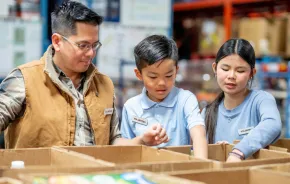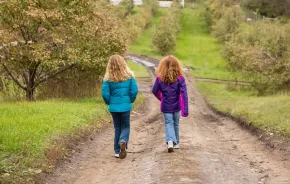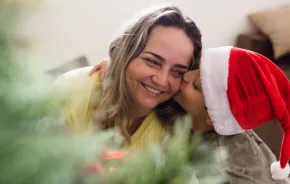 This summer will be Shaila Pierce-Hamel's fifth summer at Camp Ten Trees and she can't wait.
This summer will be Shaila Pierce-Hamel's fifth summer at Camp Ten Trees and she can't wait.
"We have camp songs about all kinds of families, like Herman the Worm who eats his two moms," said Shaila.
This is no ordinary summer camp.
Camp Ten Trees is a nonprofit organization offering summer camp sessions in the Pacific Northwest, featuring a week for lesbian, gay, bisexual, transgender, queer, questioning, and allied (LGBTQA) youth, and a week for children and youth of LGBTQ and/or non-traditional families. It was founded in 2001 and was one of the first camps of its kind in the world.
A neighbor recently told me about Ten Trees and I was intrigued with what is the only residential summer camp in the Pacific Northwest specifically focusing on LGBTQ identity issues.
These days we are seeing more and more kids exploring their identity at younger ages. And because it is becoming so common, there is a growing transparency of these issues. We still have a ways to go in terms of making it safe for kids to be open and to truly be themselves, but I feel optimistic that the “hush-hush-ness” is becoming old news.
For example, there has been a recent media buzz about transgender issues: A New Yorker article explored the journey of a young girl who decided to identify as a boy. Media stories on this topic are becoming more common (here's a recent TV news segment about a transgender high school student). And not too long ago, I saw the groundbreaking documentary Bully, which profiled a boy who was physically and verbally abused for being gay and later, as an adult, sued the school district. The It Gets Better Project has also helped break down stereotypes and support LGBT youth since its inception in 2010.
Camp Ten Trees looks from the outside like any summer camp offering arts and crafts, swimming, boating, nature walks, low ropes challenge, archery and sports, but it is actually a place where kids can come and be themselves and find a sense of belonging with others.
"Our kids are in the minority in their home communities, and have often experienced being marginalized or bullied because of their family status, sexual orientation or gender identity. To be able to join a community where their experience is central is a great gift, and I think it keeps some of them going the rest of the year," explained Laura Pierce, Shaila’s mom.
What’s amazing is that the camp, founded in 2001, is almost completely volunteer-run, with only two paid staff members, Executive Director Airen Lydick and a Camp Director Cori Jaeger.
"These volunteers have other lives as teachers, community organizers, health care providers, youth workers, activists, parents, social workers ... Because of this, they bring a depth of skills and experience to the camp sessions that allows them to support youth development and engagement wherever it can happen … even if that’s in a canoe," explained Lydick.
“If you're a female-bodied individual and you're questioning your gender and you're not sure if you want to be with a lot of female-bodied girls, you can go live in Genderlandia, and that means you’re going to be living and having conversations with other campers that are questioning their gender or that their gender is really fluid,” said one Camp Ten Trees volunteer.
 Along with the summer fun activities are unique learning tracks which allow campers to explore identity, issues of oppression/privilege, youth coalition building, and social justice. These are issues that would be considered off-topic at any other summer camp — racism, sexuality, bullying, addiction, sexism, abuse, self-harm, and classism — but they are openly explored and discussed at Camp Ten Trees.
Along with the summer fun activities are unique learning tracks which allow campers to explore identity, issues of oppression/privilege, youth coalition building, and social justice. These are issues that would be considered off-topic at any other summer camp — racism, sexuality, bullying, addiction, sexism, abuse, self-harm, and classism — but they are openly explored and discussed at Camp Ten Trees.
Wow. My daughter, who from time to time, would peek over my shoulder as I was writing this said to me, “That sounds like a really fun camp!” And the more I read and learned about the camp and its positive energy, the more excited I became. This means that people are coming together to actively create a place where children can be accepted and cared for. And we need more of this kind of thing.
And, thinking about what could be like at this camp brings back for me the vivid sense of belonging I felt as a young adult when I attended the Alexander Graham Bell Association for the Deaf’s bi-annual convention. When you are with people who are similar to you in some crucial way, there is no need to explain about your hearing loss — everyone just “gets it”.
I think you can tell from these online comments (and there are many more) just how meaningful and powerful Camp Ten Trees is for so many young people:
• One parent reported that her son "had found his people."
• "As a kid of divorced lesbian moms, [my son] often has a lot of explaining to do out in the world. The acceptance that he soaks up during his week of camp is no small deal. He came back from camp this year with a palpable joy." A parent of a CTT camper
But for Shaila Pierce-Hamel, her most vivid memory of camp was a very universal summer camp joy:
"One night at CTT, our cabin had a plan to sleep out in the meadow. It was the night of a meteor shower. We saw all these amazing meteors going across the sky."
I look forward to sharing my ideas with you in this space. Please don’t hesitate to contact me with your own thoughts and ideas.
 Elizabeth Ralston is a writer with a public health background. She writes about topics on philanthropy, including profiles of inspiring people and organizations on her blog, The Inspired Philanthropist . When she is not writing, she enjoys spending time in the great outdoors with her family. You can follow her on Twitter.
Elizabeth Ralston is a writer with a public health background. She writes about topics on philanthropy, including profiles of inspiring people and organizations on her blog, The Inspired Philanthropist . When she is not writing, she enjoys spending time in the great outdoors with her family. You can follow her on Twitter.









